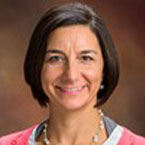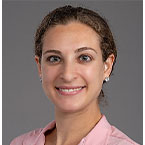By: Roni Robinson, MSN, RN, CRNP & Elizabeth B. Portin, DO, FAAP
When your child is diagnosed with a concussion, it's natural to feel worried. A concussion is a type of mild traumatic brain injury (TBI). It can affect how your child feels, thinks and acts for a little while.
The good news is that with the right care and support, most kids recover from a concussion within a few weeks. Read on to learn more about concussions and ways you can help your child get back to feeling like themselves.
What happens during a concussion?
A concussion can be caused by a bump, blow or jolt to the head or by a hit to the body. The impact causes the head to move quickly back and forth. The brain twists inside the skull, stretching the brain cells. This creates chemical changes in the brain that temporarily disrupt normal brain function.
Concussions can happen even when a child does not
lose consciousness. In fact, only 10% of children with concussions report being "knocked out."
What are some common concussion symptoms?
Some symptoms of a concussion can appear right after the injury. Others may not show up for a few days. Sometimes, concussion symptoms are subtle and may not be obvious.
Concussion symptoms vary from person to person. They can even be different for the same person if they have had previous concussions. Generally, though, concussion symptoms generally fall into 4 categories:
Physical symptoms
Cognitive symptoms
Feeling mentally "foggy" and slowed down
Difficulty concentrating & remembering things
Confusion about recent events
Slow to answer questions & repeats questions
Emotional symptoms
Sleep-related symptoms
How long does it take to recover from a concussion?
For most children and teens with concussion, symptoms last about a month. Children may take longer to recover than adults because their brains are not as mature as adults. Your child's doctor can help create a plan for the recovery process.
What to do if your child has a concussion: recovery tips
Allow for some rest
For the first few days after a concussion, it's important to take a break from activities that may significantly worsen concussion symptoms. Common triggers include loud noises, bright screens or lights and reading.
Activities that bring on mild symptoms will not cause concussions to last longer. However, activities that trigger more severe symptoms will cause your child not to feel well. This can make their usual daily activities more difficult.
Prioritize healthy basics
Make sure your child is drinking plenty of water, eating nutritious meals throughout the day, and getting enough sleep at night.
Arrange for rides
If your child is of driving age, they should not operate a car or other motorized vehicle while they have significant symptoms.
Continue regular medications
Your child should continue to take all usually prescribed medications, especially antidepressants or attention-deficit/hyperactivity disorder (ADHD) medications, as concussions may affect mood and concentration.
Keep an eye on vision to prevent headaches
Make sure your child wears their usual glasses or contacts if they have them. This can reduce headaches that can be caused by blurred vision.
Concussion headaches: more ways to help
Over-the-counter pain medication
Discuss with your child's doctor which pain medications are safe to give your child. Over-the-counter medications such as acetaminophen or ibuprofen can help after the injury to manage headaches. But use these medicines sparingly if needed, and not for more than 2 weeks, to prevent medication overuse headaches.
Why breaks are so important
The best treatment for a concussion headache is to take a break when symptoms increase or scale back on the specific activity that causes symptoms. Your child can then slowly ease back into that activity based on how much they tolerate.
Keep in mind that low brain energy is the main problem after concussion. It is like your child's brain battery is low and needs to be recharged with breaks more often than usual.
Returning to school after a concussion
Your child may need to stay home from school for a day or two after their concussion. It is recommended they return to school after that time—even if they still have concussion symptoms—but with academic adjustments and supports. This should include breaks throughout the day. They may need to attend partial or half days of school at first, and then gradually advance to a full day of school.
Communicate & have a plan
Reach out to teachers, nurses and other school staff before your child returns. They can help create a return-to-school plan that may include:
short-term academic accomodations, such as reducing the workload
extra time for assignments and testing
taking breaks through the day
Your child should focus on returning to their regular day-to-day activities and school first. This should come before easing back into other activities such as extracurriculars.
Returning to exercise after a concussion
Encourage light aerobic activity such as brisk walking or light jogging, which may help improve concussion symptoms. If these activities start to cause symptoms, your child can simply stop and take a break. Then, they can return to the activity again when their symptoms improve.
Your child should not return to organized or contact sports or activities until cleared by their healthcare provider.
Mental health & concussion recovery: check in with your child often
Your child may start feeling frustrated or sad if their concussion seems to be taking a long time to resolve. Changes in routines, stress about missed schoolwork or worry about ongoing symptoms can upset a child's mental health.
It can be especially challenging for athletes who are not able to go back to their sport. Do frequent check-ins with them to see how they are coping. You may also want to consider seeking professional counseling to support them through the concussion recovery process.
Remember
Every concussion is different. It is important to address each child's unique symptoms to help them recover. Remember that while concussions can greatly impact your child's mood and cognition or thoughts, symptoms will usually completely resolve over time.
Don't hesitate to contact your primary care provider for more assistance with your child's concussion.
More information
About Ms. Robinson
 Roni L. Robinson, MSN, RN, CRNP, a nurse practitioner with the Minds Matter Concussion Program at Children's Hospital of Philadelphia is a member of the American Academy of Pediatrics Traumatic Brain Injury Advisory Board. Roni L. Robinson, MSN, RN, CRNP, a nurse practitioner with the Minds Matter Concussion Program at Children's Hospital of Philadelphia is a member of the American Academy of Pediatrics Traumatic Brain Injury Advisory Board.
|
About Dr. Portin
 Elizabeth B. Portin, DO, FAAP, is board certified in Pediatrics and Primary Care Sports Medicine and a member of the American Academy of Pediatrics Council on Sports Medicine and Fitness. She is an Assistant Professor of Pediatrics at Rush University Medical Center in Chicago where she sees both general pediatric and pediatric sports medicine patients. Elizabeth B. Portin, DO, FAAP, is board certified in Pediatrics and Primary Care Sports Medicine and a member of the American Academy of Pediatrics Council on Sports Medicine and Fitness. She is an Assistant Professor of Pediatrics at Rush University Medical Center in Chicago where she sees both general pediatric and pediatric sports medicine patients.
|